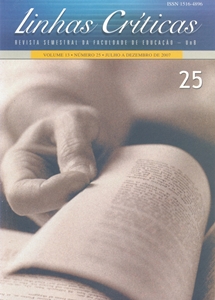Afeto e auto-estima nas relações interativas em início de escolarização
DOI:
https://doi.org/10.26512/lc.v13i25.3414Keywords:
Afeto;, Auto-estima;, Desenvolvimento infantil;, Início de escolarizaçãoAbstract
Este artigo, à luz da perspectiva sócio-histórico-cultural, discute o afeto e a auto-estima nas relações diádicas professora-alunos e alunos-alunos no início da escolarização. Discorre acerca dos principais conceitos envolvidos e destaca os papéis da comunicação e da metacomunicação em tais interações, relacionando-os à construção da auto-estima. Sumariza estudo empírico realizado pelo autor envolvendo 12 crianças de uma 1ª Série do Ensino Fundamental (atual Segundo Ano) de uma escola pública no DF (seis com indícios de desejável e seis de indesejável auto-estima). Objetivou, entre outras questões, compreender as possíveis motivações potencialmente incrementadoras de mudanças no curso dos processos de construção da auto-estima, a partir das interações comunicativas e metacomunicativas diádicas crianças-crianças e professora-crianças. Entre as principais conclusões, sugere-se o premente e permanente investimento na qualidade das interações comunicacionais e metacomunicacionais afetivas no contexto estudado para a ampliação das possibilidades da construção mais desejável possível da auto-estima dos nossos pequenos escolares.
Downloads
References
ARISTÓTELES. Ética a Nicômacos. Brasília: Edunb, 2001.
BATESON, Gregory. Steps to an ecology of mind: collected essays in anthropology, psychiatry, evolution,and epistemology. New York: Ballantine, 1972.
BERNE, Eric. Os jogos da vida:a psicologia transacional e o relacionamento entre as pessoas. SãoPaulo: Nobel, 1995.
BERNET, Christine; RICK, Ingram; BRENDA, Johnson. Self-esteem. In: COSTELLO, CharlesG. (Ed.). Symptoms of depression.New York: Wiley, 1993. p. 85-86.
BRANCO, Ângela; VALSINER, Jaan. Changing methodologies: a co-construtivist study of goalorientation in social interactions. Psychology and Developing Societies, London, v. 9, n. 1, p. 35-64,1997.
COOPERSMITH, Stanley. The antecedents of self-esteem. San Francisco: Freeman, 1967.
CUNHA, Antônio. Dicionário etimológico Nova Fronteira da língua portuguesa. Rio de Janeiro:Nova Fronteira, 1986.
DEL PRETTE, Zilda; PAIVA, Mirella; DEL PRETTE, Almir. Contribuições do referencial dashabilidades sociais para uma abordagem sistêmica na compreensão do processo de ensino-apren-dizagem.Interações, São Paulo, v. 10, n. 20, p. 57-72, jul.-dez., 2005.
DeMAUSE, Lloyd. Historia de la infancia. Madrid: Alianza, 1995.
FERREIRA, Aurélio Buarque. Novo Aurélio século XXI: O dicionário da língua portuguesa. Rio deJaneiro: Nova Fronteira, 1999.
FLETCHER, Kathryn; HUFFMAN, Lisa; BRAY, Norman; GRUPE, Lisa. The Use of theMicrogenetic Method with Children with Disabilities: Discovering Competence. DevelopmentalTheory and Research, Philadelphia, v. 9, 1998. Disponível em: <http://www.uab.edu/cogdev/earlyed.htm>.Acesso em: 6 abr. 2005.
GALVÃO, Isabel. Wallon:uma concepção dialética do pensamento infantil. Petrópolis: Vozes,1995.
GARCIA, Regina Leite. O afeto entra mais na escola desta vez por outras portas. Revista Proposta,Rio de Janeiro, v. 28, n. 83, p. 32-38, dez. 1999.
GOODLAD, John. A place called school:prospects for the future. Hightstown, New Jersey:McGraw Hill, 1983.
JAMES, William. Principles of psychology.New York: H. Holt, 1890. Disponível em:<http://psychclassics.yorku.ca/James/Principles/prin10.htm>. Acesso em: 30 ago. 2005.
HUMPHREYS, Tony. Auto-estima:a chave da educação para seu filho. São Paulo: Ground, 2001.
LEITE, Isabel. Emoções, sentimentos e afetos:uma reflexão sócio-histórica. Araraquara: JM, 1999.
MACCOBY, Elleanor. Social development. New York: Wiley, 1980.
MACIEL, Diva; BRANCO, Ângela; VALSINER, Jaan. Bidirectional process of knowledgeconstruction in teacher-student transaction. In: BRANCO, Angela; VALSINER, Jaan (Orgs.).Communication and metacommunication human development. Connecticut: IAP, 2004, p. 109-125.
MINKOWSKI, Eugène. Vers une cosmologie.Paris: Éditions Payot & Rivages. Trad.: NorbertoAbreu e Silva Neto para uso dos alunos da disciplina Epistemologia da Psicologia do Instituto dePsicologia da UnB, 1999.
PIAGET, Jean. The relation of affetivity to intelligence in the mental development of the child.Bulletin of the Menninger Clinic, London, v. 26, n. 3, p. 158-200, mar. 1962.
PRADO, Adélia. Poesia reunida. São Paulo: Siciliano, 1991.
SCHORE, Allan. An Interview with Allan Schore, 'the American Bowlby'. In: The Psychotherapist,London, 2001. Disponível em: .Acesso em: 29 nov. 2006.
SIEGLER, Robert; CROWLEY, Kevin. The microgenetic method: a direct means for studyingcognitive development. American Psychologist, Washington D.C., v. 46, n. 6, p. 606-620, 1991.
SILVA, Cassiane. Afetividade e cognição:a dicotomia entre o “saber” e o “sentir” na escola. Porto:2004. Disponível em: . Acesso em: 1 dez. 2006.
SWAYZE, Marian. Self-concept development in young children. In: YAWKEY, Thomas D.(Org.). The self-concept of the young child. Provo: Brigham Young University Press, 1980.
UNICEF. Situação mundial da infância. (2005). Disponível em: . Acesso em:30 jan. 2008.
______. Situação mundial da infância. (2006). Disponível em: . Acesso em:30 jan. 2008.
______. Situação mundial da infância. (2007). Disponível em: . Acesso em:30 jan. 2008.
UNICEF. Situação mundial da infância. (2008). Disponível em: . Acesso em:30 jan.2008.
VALSINER, Jaan. Human development and culture:the social nature of personality and its study.Lexington, MA: Lexington Books, 1989.
______. Affective fields and their development. In: ______. Comparative Study of human cultural development. Madrid: Fundación Infancia y Aprendizaje, 2001, p. 159-181.
VIGOTSKI, Liev Semionovich. Teoria e método em psicologia. São Paulo: Martins Fontes, 1996.
WANG, Younghee. Metacommunication and problem solving in a collaborative task of young children.1999. 115f. Thesis submitted to the University of Massachusetts for degree of doctor of education.Massachusetts, USA.
WEREBE, Maria José Garcia; NADEL-BRULFERT, Jaqueline. Henri Wallon. São Paulo: Ática,1986.
Downloads
Published
How to Cite
Issue
Section
License
Copyright (c) 2016 Linhas Críticas

This work is licensed under a Creative Commons Attribution 4.0 International License.
Authors who publish in this journal agree to the following terms:
-Authors maintains the copyright and grants the journal the right of first publication, the work being simultaneously licensed under the Creative Commons Attribution License which allows the sharing of the work with recognition of the authorship of the work and initial publication in this journal.
- Authors are authorized to enter into additional contracts separately, for non-exclusive distribution of the version of the work published in this journal (eg publish in institutional repository or as a book chapter), with acknowledgment of authorship and initial publication in this journal.
-Authorers are allowed and encouraged to publish and distribute their work online (eg in institutional repositories or on their personal page) at any point before or during the editorial process, as this can generate productive changes as well as increase the impact and the citation of published work (See The Effect of Free Access).



